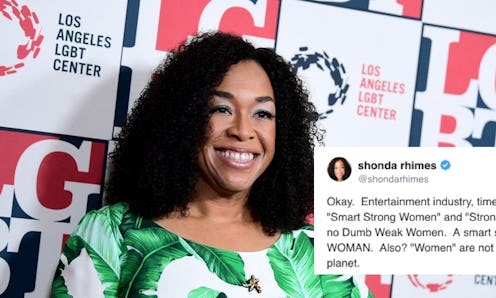Entertainment
This Tweet From Shonda Rhimes Will Make You Rethink The Phrase “Strong Female Character”

From Olivia Pope to Meredith Grey, Shonda Rhimes is known for developing influential characters on screen, and now, the television mogul and New York Times best-selling author wants to use her own influence change some common industry phrases. On Thursday, Feb. 1, Rhimes tweeted about "strong female characters" and "smart strong women" being condescending phrases, and asked that the industry considers never using terms like these to describe female characters again. And there are so many people on Twitter who totally agree.
Rhimes tweeted,
"Okay. Entertainment industry, time to stop using the phrases 'Smart Strong Women' and 'Strong Female Leads'. There are no Dumb Weak Women. A smart strong woman is just a WOMAN. Also? 'Women' are not a TV trend -- we're half the planet."
Adding "strong" or "smart" in front of "female character" just screams patriarchy, and Rhimes seems to think so too. While being considered strong or smart can be a compliment, male characters are rarely, if at all, addressed with adjectives that describe their ability to support one's self, or their importance to the story at hand. A male actor is rarely called a "strong" or "independent male lead," because according to society, it's expected for a man to be strong. But when thinking about women being placed at the helms of stories, the identifiers are too often used to show audiences all other woman is helpless, dumb, or weak.
The term "woman" should be able to stand alone, without the strength-building adjectives validating her ability to lead, just as the term "man" does. And there's no one more perfect than Rhimes to push the industry in this direction.
Miss Sloane star Jessica Chastain responded to Rhimes' tweet and told of her own personal experiences with being told she plays "strong women" on screen. And instead of calling the roles "strong" or "smart female leads," Chastain is suggesting that the new normal should be "well written women."
Along with challenging the industry's status quo, Rhimes also wants to set the record straight on one other thing: Having female leads should not be considered a trend. Shondaland is not only helmed by Rhimes herself, but also by her female actors, such as Viola Davis and Kerry Washington, so it's safe to bet that she knows a thing or two about a woman's ability to lead captivating stories, without the rescue of male counterparts.
The industry, however, is just getting the memo. The year 2017 has been dubbed "the year of women" for quite a few reasons — the influx of women speaking out against powerful men in Hollywood included — but, it was also the year that women-led stories took over the box office. And as a result, it was predicted that the those very films would be the ones to clean up during the 2018 awards season. It's all bittersweet, however. While it's great to see women-led stories being told, and praised for their amazingness, there's also the possibility that industry heads will latch on to the movement, not because they see the importance of the inclusiveness of women's stories, but rather for its trendiness.
It's no secret that the entertainment industry will pour money into whatever's popular at the moment — like coveted sitcom reboots, and well, the Kardashians. But inclusive storytelling should never be considered "trendy," and treating it as such is not only dismissive, but a slap in the face to any and everyone who isn't the industry's norm — white and male.
Rhimes' followers on Twitter seem to be on board with shifting the way the world views female characters, and along from praises for speaking out about it, some followers even mentioned that they didn't realize the offensiveness before engaging in the conversation online.
Thanks to Rhimes' outcry, the conversation surrounding equal and just treatment in Hollywood is being has another angle to explore. Those using "strong" or "smart" to describe female leads may not have had bad intentions when doing so, but as Rhimes points out, there are ways to characterize those roles without putting others down in the process.